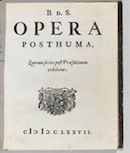
Selection from –Political Treatise - Chapter IV, of the functions of supreme authorities. (Page 2)
Spinoza's Words – (a commonwealth does wrong when it acts against the dictate of reason)
 But it is often asked, whether the supreme authority is bound by laws, and, consequently, whether it can do wrong. Now as the words "law" and "wrong-doing" often refer not merely to the laws of a commonwealth, but also to the general rules which concern all natural things, and especially to the general rules of reason, we cannot, without qualification, say that the commonwealth is bound by no laws, or can do no wrong.
But it is often asked, whether the supreme authority is bound by laws, and, consequently, whether it can do wrong. Now as the words "law" and "wrong-doing" often refer not merely to the laws of a commonwealth, but also to the general rules which concern all natural things, and especially to the general rules of reason, we cannot, without qualification, say that the commonwealth is bound by no laws, or can do no wrong.
For were the commonwealth bound by no laws or rules, which removed, the commonwealth were no commonwealth, we should have to regard it not as a natural thing, but as a chimera.
A commonwealth then does wrong, when it does, or suffers to be done, things which may be the cause of its own ruin; and we can say that it then does wrong when it acts against the dictate of reason.
For a commonwealth is most independent when it acts according to the dictate of reason (Chap. III. Sec. 7); so far, then, as it acts against reason, it fails itself, or does wrong. And we shall be able more easily to understand this if we reflect, that when we say, that a man can do what he will with his own, this authority must be limited not only by the power of the agent, but by the capacity of the object. If, for instance, I say that I can rightfully do what I will with this table, I do not certainly mean, that I have the right to make it eat grass.
So, too, though we say, that men depend not on themselves, but on the commonwealth, we do not mean, that men lose their human nature and put on another; nor yet that the commonwealth has the right to make men wish for this or that. The commonwealth, then, to maintain its independence, is bound to preserve the causes of fear and reverence, otherwise it ceases to be a commonwealth.